– By Kriti Keya
With diplomatic talks seemingly stalled and the battle of the giants intensifying, let’s look at the current Ukrainian crisis that has the potential of igniting a confrontation with echoes of the 1962 Cuban Missile Crisis.

History
Breaking of its western territory into independent states including Ukraine, spelt the end of the Cold War superpower- The Soviet Union. When these countries started drifting towards developing a stronger relationship with western Europe, Russia started to destabilize them. Similarly, in East Ukraine (particularly Donbass Region) that has been the hotbed of rebellion and pro-Russian sentiment, Russia supports the separatists with arms and ammunition to thwart the aim of the United States and its European allies of making Ukraine a western bulwark on Russia’s border.
Conflict simmering since 2014
The conflict began at the end of 2013 when the Ukrainian government suspended European Union talks in order to build stronger ties with Russia. The pro-Moscow move led to a massive protest in capital Kiev which came to be known as the ‘Maidan Protests’. This subsequently followed violent repressions and forced President Viktor Yanukovich from power in February 2014.
The day after Yanukovich fled, Ukrainian parliament voted to repeal the law that gave the status of Regional Language to Russian and other minority languages. The government set about blocking access to Russian TV and radio channels for airing war propaganda. Even though the language legislation was then not put into force, in Ukraine, where a very large minority identify themselves with the Russian culture, millions of people felt under siege in what they regarded as their homeland. It was this that sowed the seeds of resistance in the eastern provinces.
Taking advantage of the already disruptive situation, Russia in March 2014 invaded and annexed Crimea (reportedly with no bloodshed or violence). In the subsequent month, pro-Russian separatists declared independence in the Donbass region of eastern Ukraine and fighting broke out. Ceasefire agreements between the West-Ukrainian forces (backed by the Ukrainian parliament) and East- Separatist forces (backed by Russia) in this region have been violated several times.
Russia in all its attempts is trying to skilfully apply its Salami tactics of slicing and conquering as is evident from the speculations of the US foreign ministry which said that it had information the Russian government was considering former Ukrainian lawmaker Yevhen Murayev as a potential candidate to head a pro-Russian leadership.
Involvement of the West
Since the Cold War ended, NATO has expanded eastward by taking new countries, some of which also included former Soviet Union nations. Russia viewed this as a threat as they resisted the incorporation of a state ‘near abroad’ into a military alliance. Ukraine joining NATO thus, follows the same logic as that of the US’s Monroe Doctrine which declared separate spheres of influence for the United States and Europe, non-colonization and, non-intervention.
Therefore, NATO’S final declaration at Bucharest Summit, April 3, 2008, “NATO welcomes Ukraine’s and Georgia’s Euro Atlantic aspirations for membership in NATO. We agreed today that these countries will become members of NATO”, hitting Moscow on its Achilles’ heel.
The idea of defending Kiev is supported with the principal arguments by the West that if Russia’s aggression isn’t stopped in Ukraine, it will postulate a domino effect whereby Moscow will be emboldened to grab other independent former Soviet republics under its thumb in ostensible defence of Russian minorities. Russia’s invasion of Georgia in 2008, and its seizure of Crimea in 2014, on the other hand were a consequence of the imbalance of power created by NATO expansion eastward.
Vestiges of a new missile crises and the Possibility of War
Ukraine has been the apple of discord in Moscow’s relation with the West, with Russia’s troops massed near Ukraine’s border and NATO’S forces on standby in case Russia attacks its neighbour. Ukraine as a whole is not united against Russia because of a longstanding cultural split within. Its geographical location also places Ukraine between the horns of dilemma where on one side it shares borders with four NATO countries and on the other, one of the main natural-gas pipelines of Russia passes through Ukraine.
The current situation echoes the Cuban Missile Crisis of 1962 when, the leader of the Soviet Union, Nikita Khruschev decided to convert Cuba (an ally) of the Soviet Union into a Russian base because he was worried that the USA would invade communist-rules Cuba and overthrow Fidel Castro, its president. In 1962, he placed nuclear missiles in Cuba. The installation of these weapons put the US, for the first time, under fire from close range by the USSR. Russia is currently under the same argument with its Foreign Minister Lavrov saying, “NATO has already come close to Ukraine. They also want to drag this country here, although everyone understands that Ukraine is not ready and could make no contribution to strengthening NATO security”, has mobilised more than 100,000 troops with arms and ammunition around Ukraine’s border.
Even though Russia currently denies any possible invasion of Ukraine (as it did in 2014, when it seized Crimea) and alleges the West of putting out information “laced with lies”, it has used its build-up of an estimated 100,000 troops along Ukraine’s borders to the north, east and south to force the West to negotiate over a range of demands to redraw the security map of Europe by securing written commitments from West to stop further eastward expansion of NATO. Among the most important demands was that Ukraine should never be allowed to join NATO. The US has ruled this out in its confidential response as is evident in what Putin told The French President Emmanuel Macron that the West has “ignored” Moscow’s security concerns.
Three weeks after the Soviet Union had placed the nuclear weapons in Cuba in 1962, the Americans became aware of it. The then US President, John F. Kennedy, determined to get Khrushchev to remove the missiles and nuclear weapons from Cuba, ordered American warships to intercept any Soviet ships heading to Cuba as a way of warning the USSR of his seriousness. A clash seemed imminent in what came to be known as the Cuban Missile Crisis. Similarly, the US has once again taken the same stance through its $200 million support in the defensive military to Kyiv to reinforce the US’ commitment to “Ukraine’s sovereignty and territorial integrity”. Russia, on the other hand, is “muscle-flexing” by sending its troops to Belarus for major war games under the pretext of the so-called “drills” which could be a prelude to an invasion by using Belarusian territory as is suspected by the West.
During the Cuban Missile Crisis (1962), the prospects of a clash seemed imminent and it therefore became a high point of what came to be known as the Cold War (as it never escalated into a hot war). Even though there were wars in various regions, with the two superpowers and their allies involved in warfare, at least the world avoided another global war.
With the current Russia allegedly engaging in ‘hybrid war’ against Ukraine, and expressing a possibility of expanding military cooperation with Cuba, Venezuela and Nicaragua as part of its retaliatory measures. And the US on the other hand, authorising the Baltic states to send Stinger anti-aircraft missiles to Ukrainian forces and attempting to choke off broad swaths of industrial and consumer technologies to Russia through its sanctions and penalties should Russia attack, only intensify the current situation which will not just impact Europe but will be like opening of a Pandora’s box for the world.
Policy Recommendations
Peace with Russia in Europe might be necessary for America to focus on Asia as hostility between the West and Russia could push Moscow’s Salami slicing tactics to cut the ribbons of politics with Beijing. Also, since Europe depends on Russia for a third of its natural gas-providing enormous leverage to Putin in any dispute with the West, therefore, any interruption would exacerbate an existing energy crisis caused by a shortage. Thus, the situation has to be diffused by negotiations on both sides otherwise it will lead to grave threat to global peace and stability.
Both the US and Russia should engage in bold diplomatic negotiations under the aegis of The Organization for Security and Co-operation in Europe (ONSE) to fashion a new security order that is better suited to the current era. A new agreement process should firstly put arms control and denuclearizing Europe on the table. Then all the parties should agree on Ukraine as a neutral country. For this, reversing the Bucharest Declaration of 2008 is the need of the hour and Russia should accept that it does not own Ukraine. The Ukrainian government should accept equal status for Russian-speaking Ukrainians and make further developments to eradicate any possible fear of subjugation and to strengthen the trust of its minorities. The only hope now is a diplomatic scramble with the reminiscence of the logic of deterrence to avert a potentially devastating new war in Europe as neither side can afford to initiate war because of unacceptable destruction that they are capable of. All eyes are now set on the negotiation in Paris, in the presence of interlocutors from France, Germany, US and Russia even though it’s going to be a labour of Hercules.
References :
‘Everything you need to know about the Ukraine Crises’, by Max Fisher (September 3, 2014) // https://www.vox.com/2014/9/3/18088560/ukraine-everything-you-need-to-know
“The Ukraine crisis is not what it seems”, by Robert H Wade (March 2015) // https://mondediplo.com/7660
‘Moscow’s Salami Tactics’, by Janusz Bugajski (December 12, 2019) // https://cepa.org/moscows-salami-tactics/
‘UK accuses Kremlin of trying to install pro-Russian leader in Ukraine’, Reuters (January 22, 2022) // https://www.reuters.com/world/uk/uk-accuses-kremlin-trying-install-pro-russian-leader-ukraine-2022-01-22/

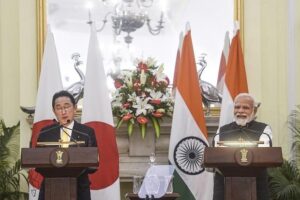

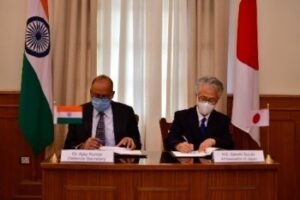
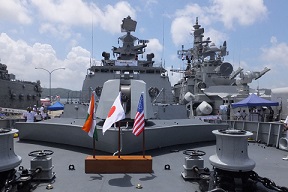
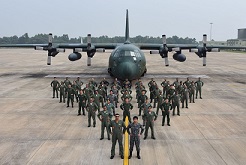

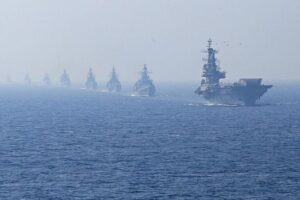

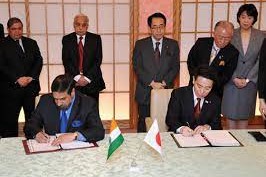

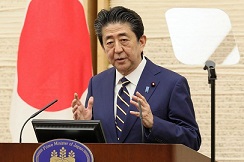
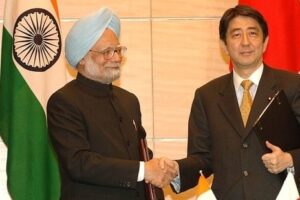

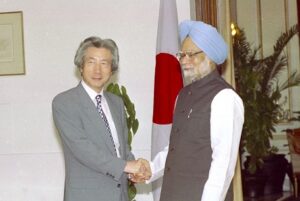
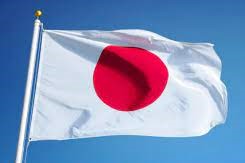
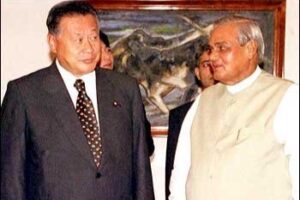
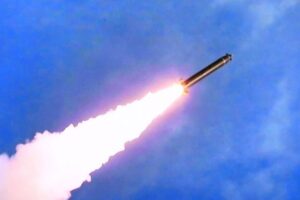



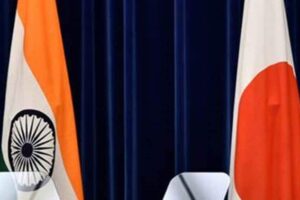
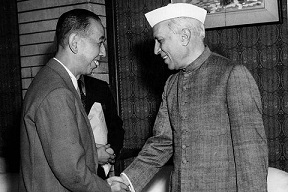
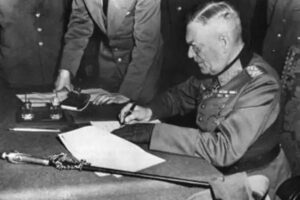

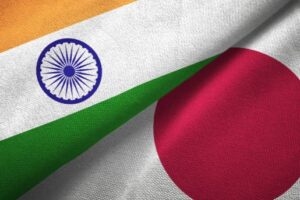
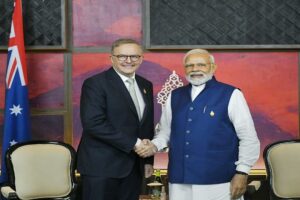
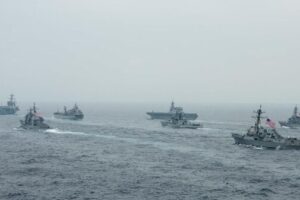
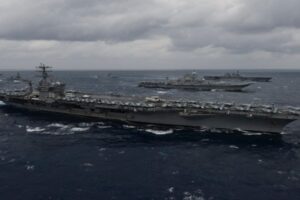
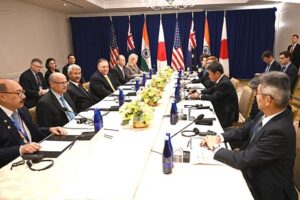
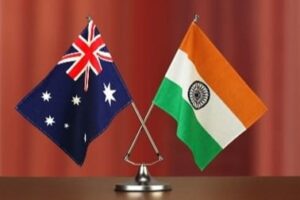
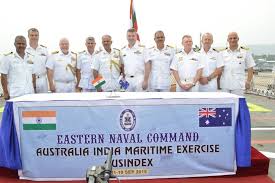

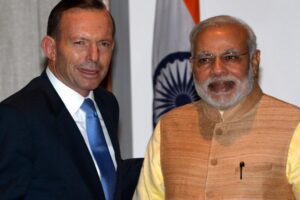
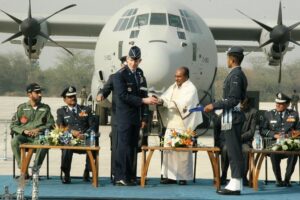
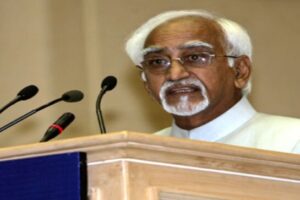


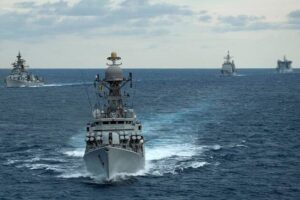
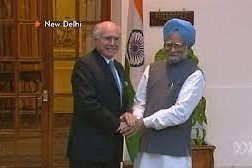
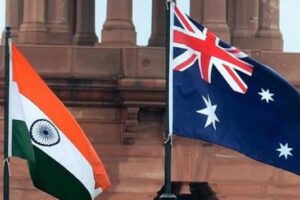
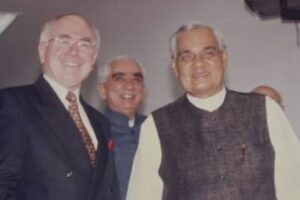
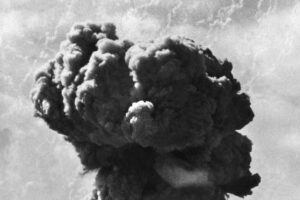
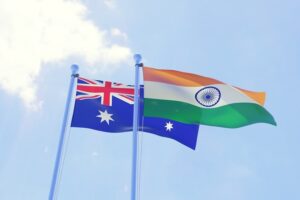

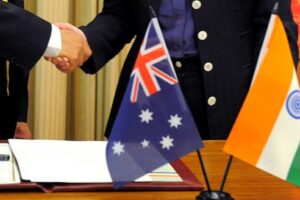
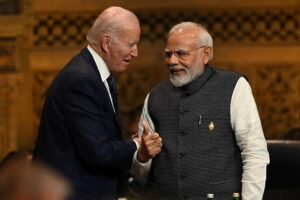
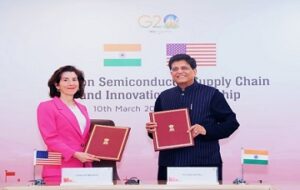
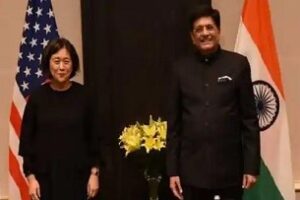
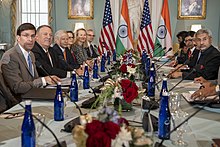
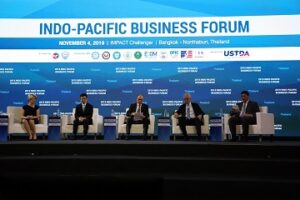
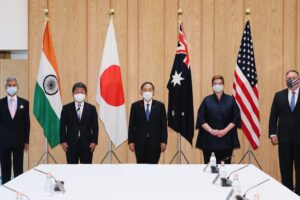
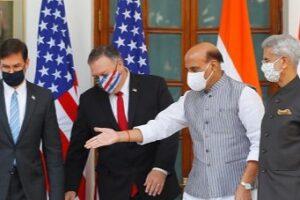
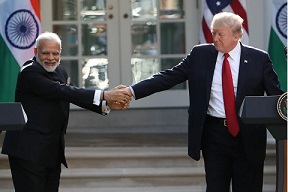
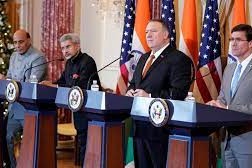
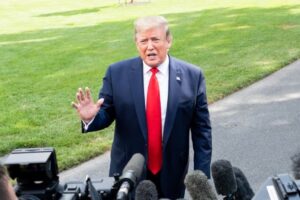
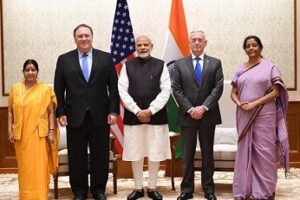
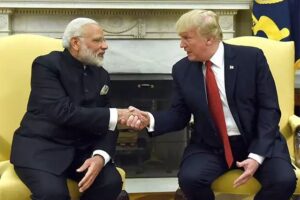
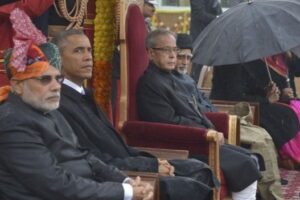
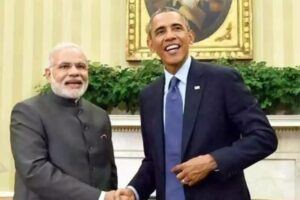
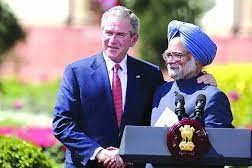
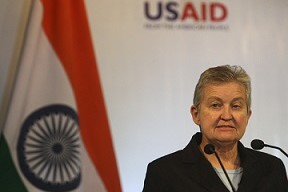
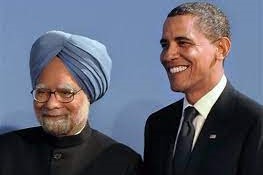
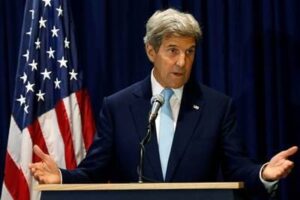
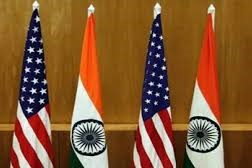
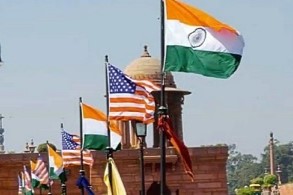
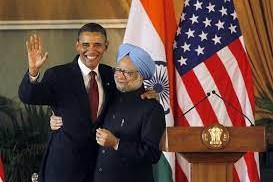
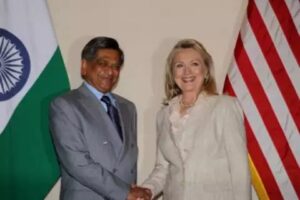
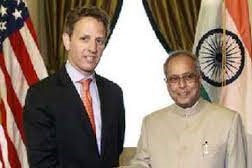
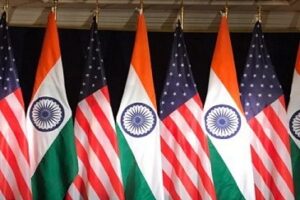
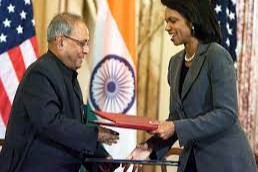
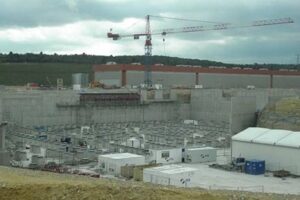
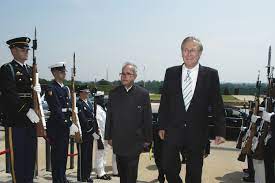
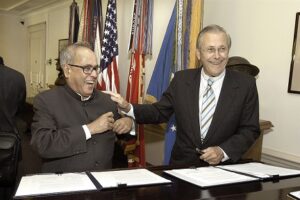
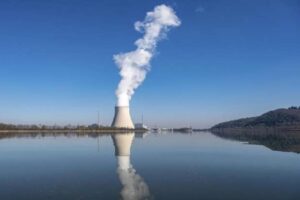
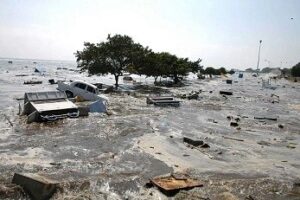
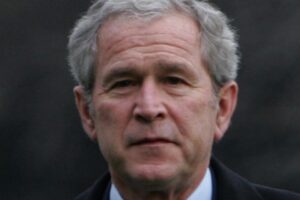
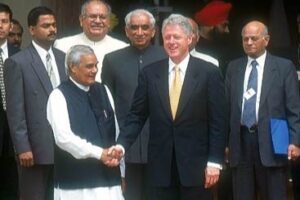
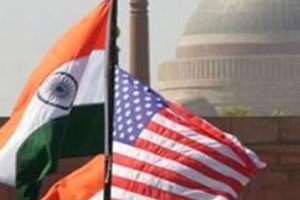
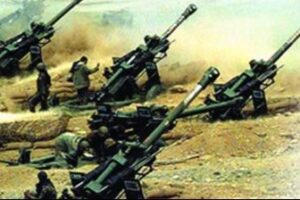
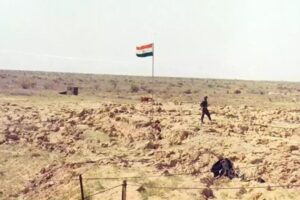 onducted a total of five underground nuclear tests, breaking a 24-year self-imposed moratorium on nuclear testing. Pakistan followed, claiming 5 tests on May 28, 1998, and an additional test on May 30. The unannounced tests created a global storm of criticism, as well as a serious setback for decades of U.S. nuclear nonproliferation efforts in South Asia. On May 13, 1998, President Clinton imposed economic and military sanctions on India, mandated by Section 102 of the Arms Export Control Act (AECA), and applied the same sanctions to Pakistan on May 30. Some effects of the sanctions on India included: termination of $21 million in FY1998 economic development assistance; postponement of $1.7 billion in lending by the International Financial Institutions (IFI), as supported by the Group of Eight (G-8) leading industrial nations; prohibition on loans or credit from U.S. banks to the government of India; and termination of Foreign Military Sales under the Arms Export Control Act. Humanitarian assistance, food, or other agricultural commodities are excepted from sanctions under the law.
onducted a total of five underground nuclear tests, breaking a 24-year self-imposed moratorium on nuclear testing. Pakistan followed, claiming 5 tests on May 28, 1998, and an additional test on May 30. The unannounced tests created a global storm of criticism, as well as a serious setback for decades of U.S. nuclear nonproliferation efforts in South Asia. On May 13, 1998, President Clinton imposed economic and military sanctions on India, mandated by Section 102 of the Arms Export Control Act (AECA), and applied the same sanctions to Pakistan on May 30. Some effects of the sanctions on India included: termination of $21 million in FY1998 economic development assistance; postponement of $1.7 billion in lending by the International Financial Institutions (IFI), as supported by the Group of Eight (G-8) leading industrial nations; prohibition on loans or credit from U.S. banks to the government of India; and termination of Foreign Military Sales under the Arms Export Control Act. Humanitarian assistance, food, or other agricultural commodities are excepted from sanctions under the law. 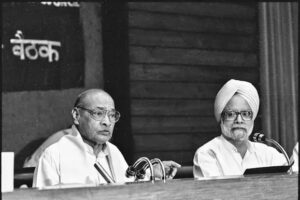
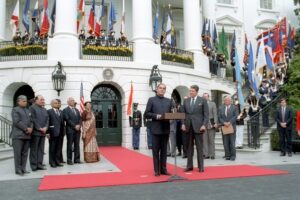
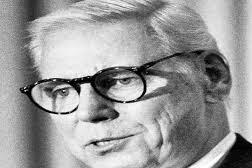
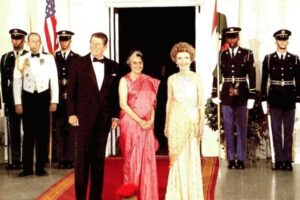
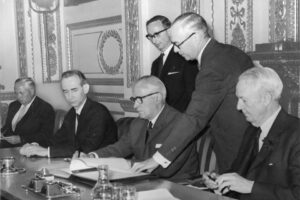
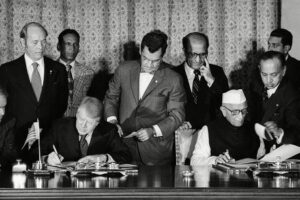
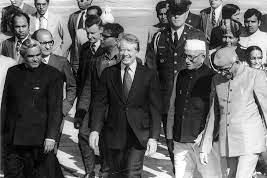
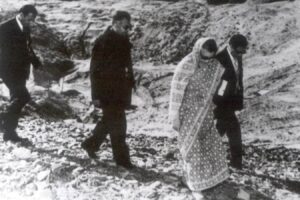
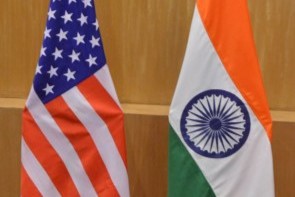

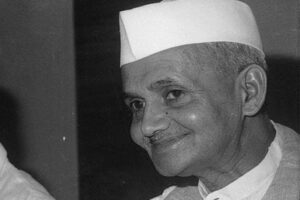

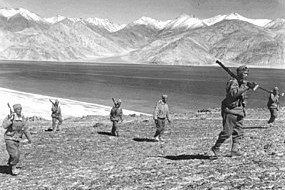
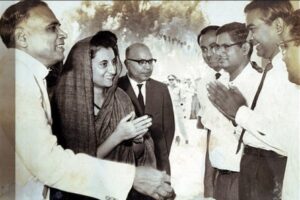
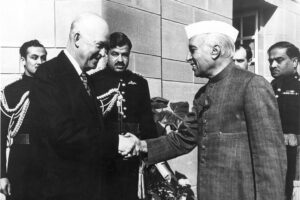
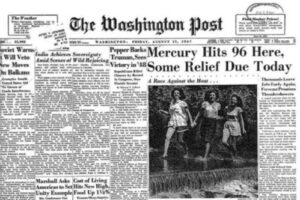
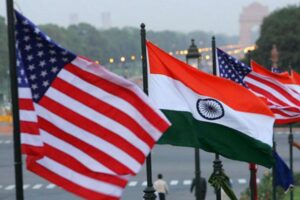
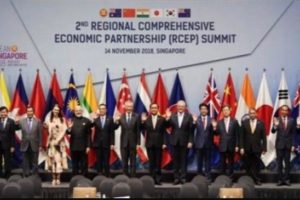 The first ministerial level meeting of QUAD was held on the sidelines of the United Nations General Assembly in New York. Before this, the QUAD had
The first ministerial level meeting of QUAD was held on the sidelines of the United Nations General Assembly in New York. Before this, the QUAD had AusIndEx is an exercise between India and Australia which was first held in 2015.The Australian
AusIndEx is an exercise between India and Australia which was first held in 2015.The Australian 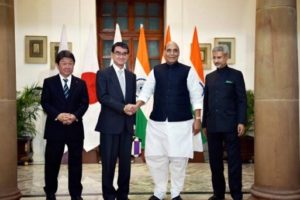
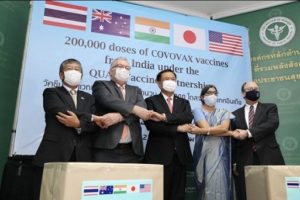
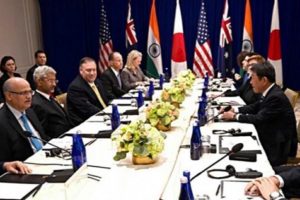
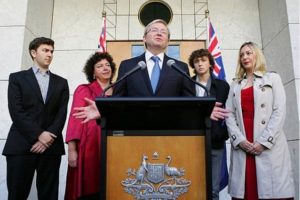
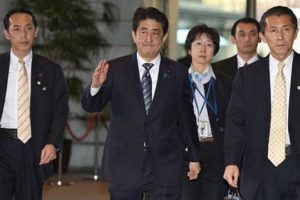
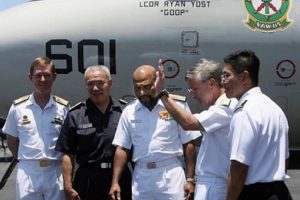
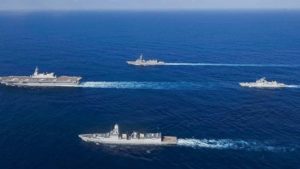
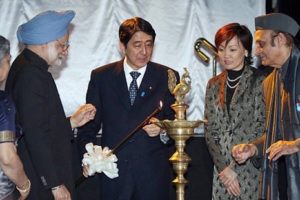
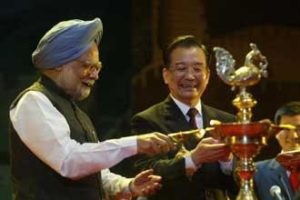 On recommendations of the Japanese government, the four countries met at Manila, Philippines for ASEAN Regional Forum (ARF) originally, but also ended up having a meeting of what we call the first meeting of four nation states on issues of
On recommendations of the Japanese government, the four countries met at Manila, Philippines for ASEAN Regional Forum (ARF) originally, but also ended up having a meeting of what we call the first meeting of four nation states on issues of 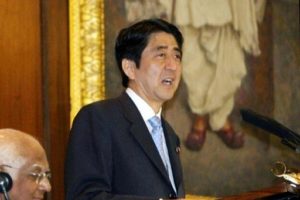 On his official visit to India, Japanese PM Mr. Shinzo Abe reinforced the ties of two nations, i.e., Japan and India with his famous speech about
On his official visit to India, Japanese PM Mr. Shinzo Abe reinforced the ties of two nations, i.e., Japan and India with his famous speech about 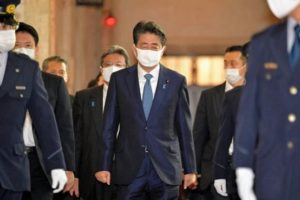 In 2007, Japanese President Shinzo Abe resigned from his post citing health reasons. This had a significant impact on QUAD as he was the architect & advocate of QUAD. His successor, Yasuo Fukuda, did not take up QUAD with such zeal leading to dormancy of the forum. (
In 2007, Japanese President Shinzo Abe resigned from his post citing health reasons. This had a significant impact on QUAD as he was the architect & advocate of QUAD. His successor, Yasuo Fukuda, did not take up QUAD with such zeal leading to dormancy of the forum. (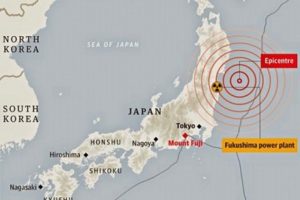 Japan earthquake and tsunami of 2011, also called Great Sendai Earthquake or Great Tōhoku Earthquake, was a 9.0 magnitude earthquake which struck below the floor of the Western Pacific at 2:49 PM. The powerful earthquake affected the northeastern coast of Honshu, Japan’s main island, and also initiated a series of large tsunami waves that devastated coastal areas of Japan, which also led to a major nuclear accident. Japan received aid from India, US, Australia as well as other countries. US Navy aircraft carrier was dispatched to the area and Australia sent search-and-rescue teams.
Japan earthquake and tsunami of 2011, also called Great Sendai Earthquake or Great Tōhoku Earthquake, was a 9.0 magnitude earthquake which struck below the floor of the Western Pacific at 2:49 PM. The powerful earthquake affected the northeastern coast of Honshu, Japan’s main island, and also initiated a series of large tsunami waves that devastated coastal areas of Japan, which also led to a major nuclear accident. Japan received aid from India, US, Australia as well as other countries. US Navy aircraft carrier was dispatched to the area and Australia sent search-and-rescue teams. 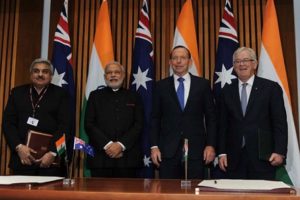 India and Australia signed the
India and Australia signed the 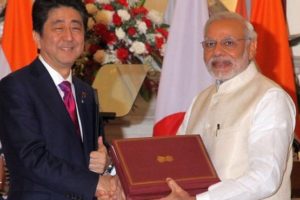 The India-Japan Agreement for Cooperation in the Peaceful Uses of Nuclear Energy was signed on 11 November, 2016 and came into force on 20 July, 2017 which was representative of strengthening ties between India and Japan. Diplomatic notes were exchanged between Dr. S. Jaishankar and H.E. Mr. Kenji Hiramatsu, Ambassador of Japan to India. (
The India-Japan Agreement for Cooperation in the Peaceful Uses of Nuclear Energy was signed on 11 November, 2016 and came into force on 20 July, 2017 which was representative of strengthening ties between India and Japan. Diplomatic notes were exchanged between Dr. S. Jaishankar and H.E. Mr. Kenji Hiramatsu, Ambassador of Japan to India. (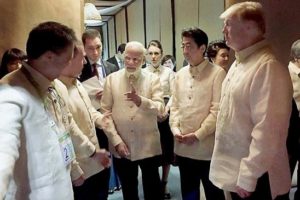 The foreign ministry
The foreign ministry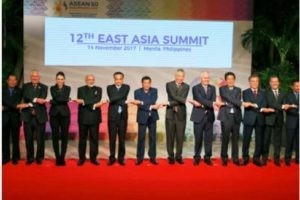 The Officials of QUAD member countries met in Singapore on November 15, 2018 for consultation on regional & global issues of common interest. The main discussion revolved around connectivity, sustainable development, counter-terrorism, maritime and cyber security, with the view to promote peace, stability and prosperity in the
The Officials of QUAD member countries met in Singapore on November 15, 2018 for consultation on regional & global issues of common interest. The main discussion revolved around connectivity, sustainable development, counter-terrorism, maritime and cyber security, with the view to promote peace, stability and prosperity in the 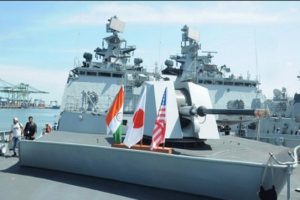 The 23rd edition of trilateral Malabar maritime exercise between India, US and Japan took place on 26 September- 04 October, 2019 off the coast of Japan.
The 23rd edition of trilateral Malabar maritime exercise between India, US and Japan took place on 26 September- 04 October, 2019 off the coast of Japan. 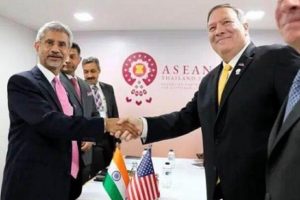 After the first ministerial level meeting of QUAD in September, 2019, the senior officials of US, Japan, India and Australia again met for consultations in Bangkok on the margins of the East Asia Summit. Statements were issued separately by the four countries. Indian Ministry of External Affairs said “In statements issued separately by the four countries, MEA said, “proceeding from the strategic guidance of their Ministers, who met in New York City on the sidelines of the UN General Assembly recently, the officials exchanged views on ongoing and additional practical cooperation in the areas of connectivity and infrastructure development, and security matters, including counterterrorism, cyber and maritime security, with a view to promoting peace, security, stability, prosperity in the Indo-Pacific region.”
After the first ministerial level meeting of QUAD in September, 2019, the senior officials of US, Japan, India and Australia again met for consultations in Bangkok on the margins of the East Asia Summit. Statements were issued separately by the four countries. Indian Ministry of External Affairs said “In statements issued separately by the four countries, MEA said, “proceeding from the strategic guidance of their Ministers, who met in New York City on the sidelines of the UN General Assembly recently, the officials exchanged views on ongoing and additional practical cooperation in the areas of connectivity and infrastructure development, and security matters, including counterterrorism, cyber and maritime security, with a view to promoting peace, security, stability, prosperity in the Indo-Pacific region.”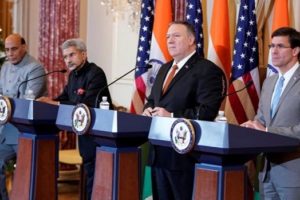 US 2+2 Ministerial Dialogue was held on 18 December, 2019, in Washington DC. Secretary of State Michael R. Pompeo and Secretary of Defense Mark T. Esper will host Indian Minister of External Affairs Dr. S. Jaishankar and Minister of Defense Shri Rajnath Singh. The discussion focussed on deepening bilateral strategic and defense cooperation, exchanging perspectives on global developments, and our shared leadership in the Indo-Pacific region.The two democracies signed the Industrial Security Annex before the 2+2 Dialogue. Assessments of the situation in Afghanistan, Pakistan, Nepal, Sri Lanka, and the Indian Ocean region in general were shared between both countries. (
US 2+2 Ministerial Dialogue was held on 18 December, 2019, in Washington DC. Secretary of State Michael R. Pompeo and Secretary of Defense Mark T. Esper will host Indian Minister of External Affairs Dr. S. Jaishankar and Minister of Defense Shri Rajnath Singh. The discussion focussed on deepening bilateral strategic and defense cooperation, exchanging perspectives on global developments, and our shared leadership in the Indo-Pacific region.The two democracies signed the Industrial Security Annex before the 2+2 Dialogue. Assessments of the situation in Afghanistan, Pakistan, Nepal, Sri Lanka, and the Indian Ocean region in general were shared between both countries. (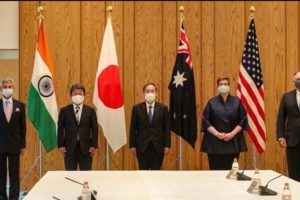 The foreign ministers of QUAD continued their discussions from the last ministerial level meeting in 2019, on 6 October, 2020. While there was no joint statement released, all countries issued individual readouts. As per the issue readout by India, the discussion called for a coordinated response to the challenges including financial problems emanating from the pandemic, best practices to combat Covid-19, increasing the resilience of supply chains, and enhancing access to affordable vaccines, medicines and medical equipment. There was also a focus on maintaining stability in the Indo-Pacific region amidst growing tensions. Australian media release mentions “We emphasised that, especially during a pandemic, it was vital that states work to ease tensions and avoid exacerbating long-standing disputes, work to counter disinformation, and refrain from malicious cyberspace activity. Ministers reiterated that states cannot assert maritime claims that are inconsistent with international law, particularly the United Nations Convention on the Law of the Sea (UNCLOS).”
The foreign ministers of QUAD continued their discussions from the last ministerial level meeting in 2019, on 6 October, 2020. While there was no joint statement released, all countries issued individual readouts. As per the issue readout by India, the discussion called for a coordinated response to the challenges including financial problems emanating from the pandemic, best practices to combat Covid-19, increasing the resilience of supply chains, and enhancing access to affordable vaccines, medicines and medical equipment. There was also a focus on maintaining stability in the Indo-Pacific region amidst growing tensions. Australian media release mentions “We emphasised that, especially during a pandemic, it was vital that states work to ease tensions and avoid exacerbating long-standing disputes, work to counter disinformation, and refrain from malicious cyberspace activity. Ministers reiterated that states cannot assert maritime claims that are inconsistent with international law, particularly the United Nations Convention on the Law of the Sea (UNCLOS).”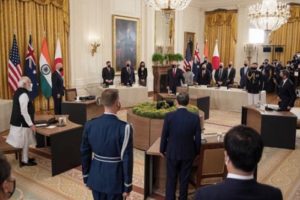 On September 24, President Biden hosted Prime Minister Scott Morrison of Australia, Prime Minister Narendra Modi of India, and Prime Minister Yoshihide Suga of Japan at the White House for the first-ever in-person Leaders’ Summit of the QUAD. The leaders released a Joint Statement which summarised their dialogue and future course of action. The regional security of the Indo-Pacific and strong confidence in the ASEAN remained on the focus along with response to the Pandemic.
On September 24, President Biden hosted Prime Minister Scott Morrison of Australia, Prime Minister Narendra Modi of India, and Prime Minister Yoshihide Suga of Japan at the White House for the first-ever in-person Leaders’ Summit of the QUAD. The leaders released a Joint Statement which summarised their dialogue and future course of action. The regional security of the Indo-Pacific and strong confidence in the ASEAN remained on the focus along with response to the Pandemic. 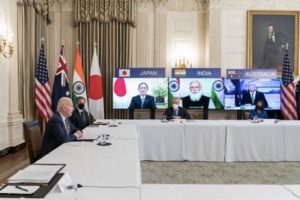 The QUAD Vaccine Partnership was announced at the first QUAD Summit on 12 March 2021 where QUAD countries agreed to deliver 1.2 billion vaccine doses globally. The aim was to expand and finance vaccine manufacturing and equipping the Indo-Pacific to build resilience against Covid-19. The launch of a senior-level QUAD Vaccine Experts Group, comprised of top scientists and officials from all QUAD member governments was also spearheaded.
The QUAD Vaccine Partnership was announced at the first QUAD Summit on 12 March 2021 where QUAD countries agreed to deliver 1.2 billion vaccine doses globally. The aim was to expand and finance vaccine manufacturing and equipping the Indo-Pacific to build resilience against Covid-19. The launch of a senior-level QUAD Vaccine Experts Group, comprised of top scientists and officials from all QUAD member governments was also spearheaded.  Although the Tsunami Core group had to be disbanded on fulfilment of its purpose, however the quadrilateral template that formed remained intact as a successful scaffolding of four countries, as stated by authors Patrick Gerard Buchan and Benjamin Rimland in their diplomatic brief about QUAD ( you can access the brief at
Although the Tsunami Core group had to be disbanded on fulfilment of its purpose, however the quadrilateral template that formed remained intact as a successful scaffolding of four countries, as stated by authors Patrick Gerard Buchan and Benjamin Rimland in their diplomatic brief about QUAD ( you can access the brief at 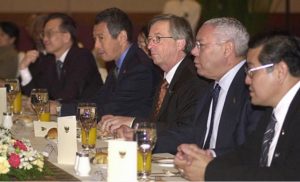 Secretary of State Colin Powell stated that the Core Tsunami Group was to be disbanded and folded and clubbed with the broader United Nations led Relief Operations. In a Tsunami Relief Conference in Jakarta, Secretary Powell stated that
Secretary of State Colin Powell stated that the Core Tsunami Group was to be disbanded and folded and clubbed with the broader United Nations led Relief Operations. In a Tsunami Relief Conference in Jakarta, Secretary Powell stated that 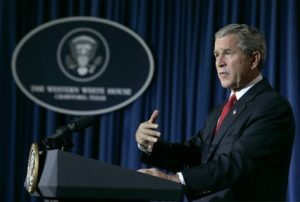 Soon after the Earthquake and Tsunami crisis, humanitarian reliefs by countries, viz., US, India, Japan, and Australia started to help the 13 havoc-stricken countries. The US initially promised $ 35 Millions in aid. However, on 29
Soon after the Earthquake and Tsunami crisis, humanitarian reliefs by countries, viz., US, India, Japan, and Australia started to help the 13 havoc-stricken countries. The US initially promised $ 35 Millions in aid. However, on 29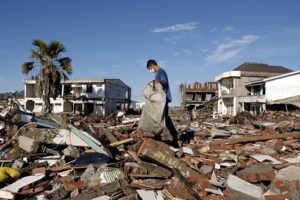 At 7:59AM local time, an earthquake of 9.1 magnitude (undersea) hit the coast of Sumatra, an Indonesian island. As a result of the same, massive waves of Tsunami triggered by the earthquake wreaked havoc for 7 hours across the Indian Ocean and to the coastal areas as far away as East Africa. The infamous Tsunami killed around 225,000 people, with people reporting the height of waves to be as high as 9 metres, i.e., 30 feet. Indonesia, Srilanka, India, Maldives, Thailand sustained horrendously massive damage, with the death toll exceeding 200,000 in Northern Sumatra’s Ache province alone. A great many people, i.e., around tens of thousands were found dead or missing in Srilanka and India, mostly from Andaman and Nicobar Islands of Indian territory. Maldives, being a low-lying country, also reported casualties in hundreds and more, with several non-Asian tourists reported dead or missing who were vacationing. Lack of food, water, medicines burgeoned the numbers of casualties, with the relief workers finding it difficult to reach the remotest areas where roads were destroyed or civil war raged. Long-term environmental damage ensued too, as both natural and man-made resources got demolished and diminished.
At 7:59AM local time, an earthquake of 9.1 magnitude (undersea) hit the coast of Sumatra, an Indonesian island. As a result of the same, massive waves of Tsunami triggered by the earthquake wreaked havoc for 7 hours across the Indian Ocean and to the coastal areas as far away as East Africa. The infamous Tsunami killed around 225,000 people, with people reporting the height of waves to be as high as 9 metres, i.e., 30 feet. Indonesia, Srilanka, India, Maldives, Thailand sustained horrendously massive damage, with the death toll exceeding 200,000 in Northern Sumatra’s Ache province alone. A great many people, i.e., around tens of thousands were found dead or missing in Srilanka and India, mostly from Andaman and Nicobar Islands of Indian territory. Maldives, being a low-lying country, also reported casualties in hundreds and more, with several non-Asian tourists reported dead or missing who were vacationing. Lack of food, water, medicines burgeoned the numbers of casualties, with the relief workers finding it difficult to reach the remotest areas where roads were destroyed or civil war raged. Long-term environmental damage ensued too, as both natural and man-made resources got demolished and diminished.
No responses yet